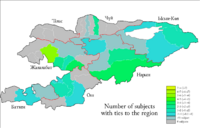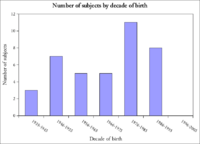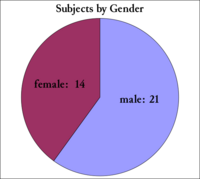Phonetic Survey of Kyrgyz Dialects
This page organises and shows off my research on the phonetics of Kyrgyz dialects which I am conducting in the 2007-2008 academic year on a Fulbright grant.
Human Subjects
After determining how I was going to conduct my project, I applied for human subjects approval. This was finally granted in April. My questionnaires and consent forms, as well as some sample images were approved.
"Fair compensation"
Human subjects ethics involves two potentially conflicting ideas—that the researcher should not coërce subjects into participation, and that the researcher should provide the subjects with fair compensation. This presents a potential conflict, especially between what's perceived by the researcher as constituting fair compensation and what's perceived by the subject as appropriate.
A few years ago, a friend of mine was conducting informal non-IRB-approved interviews in Kyrgyzstan to get a feel for a topic she was considering researching more broadly. After each interview, she compensated each subject with an American $5 bill. Many people felt insulted, as if they were being bribed for having helped her, and some others vowed to frame the bill and not use it as currency.
A year later, I found myself back in Kyrgyzstan, preparing to carry out my dialect survey, which I was applying for IRB approval for. Having witnessed my friend's research, and having some exposure to Kyrgyz customs and ways of thinking beyond that, I wasn't sure where to go with with the "fair compensation" part of my IRB application.
I ended up writing along with my IRB application that depending on where each subject was interviewed, I would preform appropriate host duties (if at my home there) or guest duties (if at another's home)—which consisted of providing tea (in the case of being a host) or bringing small consumables, such as candy or vodka (in the case of being a guest)—but that this wouldn't be seen as compensation. For compensation, I ended up offering each subject the opportunity to have a picture taken with me and sent to them, with the condition that I could show anyone I wanted the picture and use it in publications (with the option for the people in the photograph to be kept anonymous or to be listed by name).
Out of 35 subjects, each one was more than happy to have their picture taken, and even happier that I would send them a copy. Only a few subjects—mostly younger, more educated ones—opted not to have their name associated with the picture.
Preparation
- Decide what topics to examine most closely (Things to look at in Kyrgyz dialects#Linguistic topics)
- Decide what word forms/patterns would fit these topics (Things to look at in Kyrgyz dialects#List of forms to elicit)
- Find words to match these patterns (Things to look at in Kyrgyz dialects#Organising Wordlist)
- Organise words, weed out unneeded, add extra (Things to look at in Kyrgyz dialects#Final Wordlist)
- Take pictures of words found
- Print pictures
Elicitation
I ran around the country interviewing random people. More on this later.
Results



This section shows off my results. At this point, there's just some demographic data of the 35 subjects, as of the end of the fieldwork, including a map of subjects' regional affiliations, a graph of age distribution of subjects based on year of birth, and a graph showing distribution of subjects by gender.
Local research conditions
Interaction with local scholars
Fulbright scholars are supposed to declare a "host institution". Based on a suggestion from Elmira and some research on my own online, I decided to declare Бишкек Гуманитарный Университет (БГУ - Bishkek Humanities University) as my host institution.
I went there at some point early in my grant—though after having learned some Kyrgyz (early December?)—to meet with scholars and discuss my project with them. I managed to track down the guy Elmira had mentioned having studying under, and set up a meeting with him (later that week / the following week). After explaining what I was looking at to him, and having him explain a few gaps in my knowledge to me, he all but told me he didn't think there was anything left to learn by doing phonetic fieldwork on Kyrgyz dialects and showed me some books I might be interested in (mostly on literature, and the main one on dialects I already had). He told me about the primary work on Kyrgyz dialects, which I'd seen in Osh, and which I'd alraedy vowed to get my hands on a copy of. As I was getting ready to leave, I asked if he had any students who might be interested in working with me—maybe getting a copublication or course credit out of it—and his answer was, "You mean grad students." Of course. He said he had a small class studying dialects (which I was interested in sitting in on, but I got the impression that the idea made him uncomfortable), and maybe someone would be interested. Sure, he'd introduce me—some day. I left and never saw him again.
Later, this one guy (the brother of this Kyrgyz girl living in Turkey who'd stalked me through kyrgyz.us and had been talking with me online) introduced me to this one scholar at the Академия наук (Sciences academy). This scholar knew some things about dialects, but maybe not much more than the average educated Kyrgyz—just with some academic framework around it. He decided to introduce me to another scholar, who apparently wrote a book on the phonetics of Kyrgyz dialects. I met with him a couple times, told him about what I was interested in doing, and got told that "we don't do that anymore; it's too hard." And also that he'd written the book on that, and didn't think there was anything more to learn about it. He gave me a disk "with his book on it" (turned out just to be the table of contents, sadly), which I returned to him the next time I saw him—at the grand opening for a new center on language issues at the Academy of Sciences which he was somehow involved with and invited me to, basically to show off this American Kyrgyz speaker to all these Kyrgyz-speaking patriots. Also, it was an interesting day-long conference, and I got involved in some fun discussions with some Kyrgyz teachers (etc.) about the sad state of materials on the Kyrgyz language. And met a French computational linguist who was "teaching language and computers" (a joke to him) at the Academy of Sciences. And who had been making efforts to learn Kyrgyz for much longer than I had been, and had barely hit the basics. Also, this scholar I'd met with did promise to get me a copy of his book, but I never got it: I ran out of time to meet with him again, and my primary research was much more important.
Library access
Due to my lack of skills in Kyrgyz at the time, I couldn't bring myself to go to any libraries in Bishkek during my first couple months in the country.
However, over Thanksgiving I went to Osh, where one rainy afternoon, I stopped by the regional library, which was right down the road from Thatcher's place where I was staying. I went in, asked for books on Kyrgyz dialects, got a funny look and asked what I meant, repeated it, and about a minute later got handed a copy of Junusaliyev's definitive work on Kyrgyz dialects. I flipped through it for like an hour, writing down page numbers (and ranges..) in the hopes of getting it copied. I really wanted to just buy the whole thing (which I'd heard was possible), but I couldn't even bring myself to ask such an absurd question. Instead, the lady copied the parts of it for me that I requested. She had very little clue how to operate their desk-top copying machine, which was very low on toner and seemed unhappy about the cheap paper it was being fed.
Upon my return to Bishkek, I vowed to go to the national library and get a complete copy of Junusaliyev's book. I got up the energy to head there after class one day in December, and stopped in at the art museum down the street to make sure I was going in the right direction. Apparently I was only one block short of the library, but I noticed an advertisement for a photo exhibit coming up, and kept it in mind to tell Thatcher about. When I reached the library, I was turned away because I didn't have an original copy of my passport on me. I wasn't even allowed to enter beyond the lobby.
I didn't get another chance to go before new year's. After new year's, through a combination of technical issues, foggy and snowy weather, and other impedances to Thatcher's travel plans, he was stuck in Bishkek for most of a week—right in the middle of that photo exhibit. So he and I went (and Lara was supposed to join us, but never showed up), and enjoyed the museum bookshop (where Thatcher discovered a bat sleeping on the shelves), the photo exhibit, and everything else the museum had to offer. Thatcher seemed to enjoy the very idea of having a photo exhibit in that space more than anything, and we left the museum feeling pleased with ourselves, and maybe a little overwhelmed. Being a block down from the library, and still needing to get my hands on a copy of that book, I asked Thatcher if he would mind if I just stopped by the library to check for research materials. He was fine with that, so we headed down to the library. There we had some adventures with getting day passes and some unfortunate miscommunications between Thatcher and the lady standing [sitting, really] guard by the stair-well for those without day-passes (e.g., Thatcher).
In the meantime, I went upstairs, found the correct room, and asked the librarian there if they had any books on Kyrgyz dialectology. She looked a little nervous, but told me no pretty much right away. I asked her, well how about Junusaliyev's book, Кыргыз Диалектологиясы? She said they didn't have it. I knew this couldn't be right, and explained to her that I was researching these topics and had found this one book in the regional library in Osh, and was hoping to find more resources here. She could see I wasn't local and that I must've come a long ways and had learned a lot already to even be asking her about this in Kyrgyz, but she said she couldn't help me.
I headed out a little discouraged, only to find Thatcher running up the stairs as the Guardian of the Stairwell shouted after him. I told him it was time to go, and we headed back down the stairs and dealt with the guardlady. After what amounted to appologising for misunderstanding her waving her arms at Thatcher, I turned in my daypass in exchange for my passport, and we headed out. We'd just made it out the door when a girl ran out of the library and introduced herself to me. I'd noticed her sitting right by the desk where I'd asked about these resources on Kyrgyz dialects, and she, along with everyone else in that room, had been paying very close attention as I talked with the librarian. She explained to me that the librarians at this library didn't like to go digging in the archives to get books out for people—even for her, who frequently managed to convince them to—and that I'd have better luck at the Academy of Sciences. She offered to take me there and help me find what I was after, and mentioned that she knew some other sources I could look for, since she'd taken a class on Kyrgyz dialects. I made sure Thatcher could find his way back to my place, and headed off with this girl to the Academy of Sciences.
After alternatingly waiting for and not managing to catch trolleybuses and marshrutkas, we ended up just walking. It was cold, and maybe a little snowy, and at a pace I didn't set (much slower), we got there in a little over half an hour, but talked the whole way. It turned out that they were closing right as we got there, so we headed back the direction we'd come. We stopped outside the National University (I didn't know it yet, but she lived near there) and talked for a good long while before parting ways to head home. Shortly after that we met a few times and talked about language and other such things, and she lent me her notes and other materials from her Kyrgyz dialectology class to copy. We ended up going out for Valentine's day (she tricked me into it: "You free this week? Cool, is Wednesday good? Sure, Thursday's fine."), and started meeting on a more regular basis around then. By the end of May we were officially a couple.